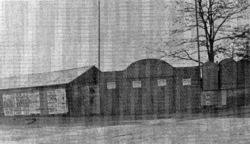Outgrounds
Hampshire has used several "outgrounds" as venues for home matches. In 1875, Hampshire played two matches in Winchester at the Green Jackets Ground and Winchester College. In 1888, Hampshire began playing first-class matches in Portsmouth at the United Services Recreation Ground, used by the officers and ranks of services teams based in the city. [17] Hampshire would use the United Services Recreation Ground as an outground for over a century, [17] playing 316 first-class and 54 one-day matches there, [18] [19] before matches hosted in Portsmouth were moved to the Rose Bowl upon its completion. In 1897, Hampshire began playing at Dean Park Cricket Ground in Bournemouth. With the early matches played there proving to be financially successful, the ground was afforded two Hampshire home matches per season starting in 1899, which formed part of the matches played there during the Bournemouth Cricket Week. [21] Following changes to county borders in 1972 that transferred Bournemouth from Hampshire to Dorset, Hampshire's use of the ground diminished and it last played host to a Hampshire home fixture in 1992. [22] During Hampshire's use of Dean Park, they played 336 first-class and 68 one-day matches. [23] [24]
Shortly after the turn of the twentieth century, Hampshire played one first-class match in Alton at the Municipal Ground against the touring South Africans in 1904. The following year, they played at the Officers Club Services Ground in Aldershot for the first time, which is also the home ground of the British Army cricket team; they would play five first-class matches there up to 1948. [27] In 1906, Hampshire played at May's Bounty in Basingstoke for the first time. They played intermittently at May's Bounty until 2010, playing 46 first-class and 30 one-day matches there. [29] [30] Hampshire played on the Isle of Wight, which had become its administrative county separate from Hampshire in 1890, for the first time in 1938 at the Victoria Recreation Ground in Newport, but played there for only two seasons before the Second World War. They returned to the island in 1956, playing annually at the newly constructed J Samuel White's Ground in Cowes until 1962. [4] Half a century would pass before Hampshire would play matches at a new outground. This would come in 2013, when the Nursery Ground, located adjacent to the Rose Bowl, hosted a first-class MCC Universities Match against Loughborough MCCU. [33] In 2019, with the Rose Bowl hosting matches in the World Cup, Hampshire returned to the Isle of Wight to play at the Newclose County Cricket Ground near Newport; [34] since 2019, one first-class and two one-day matches have been played there. [35] [36]












